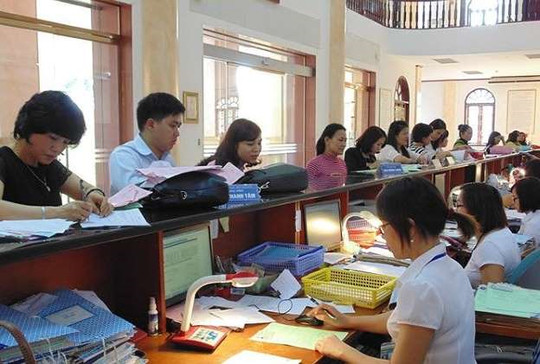The Government issued new regulations on disciplining cadres, civil servants and public employees.
(Baonghean.vn) - On September 18, 2020, Prime Minister Nguyen Xuan Phuc issued Decree No. 112/2020/ND-CP on disciplinary action against officials, civil servants and public employees.
 |
| Officials of Nghe An Department of Home Affairs discuss administrative procedure settlement with officials and civil servants of Ben Thuy ward, Vinh city. Illustrative photo Thanh Le |
According to Decree No. 112/2020/ND-CP, violations subject to disciplinary action include:
-Officials and civil servants,Officials who violate regulations on the obligations of cadres, civil servants, and public employees; things that cadres, civil servants, and public employees are not allowed to do; internal rules and regulations of agencies, organizations, and units; violations of ethics, lifestyle, or other violations of the law while performing official duties shall be subject to disciplinary action.
- The level of violation is determined as follows:
A violation causing less serious consequences is a violation of a nature and level of harm that is not great, has an impact within the internal scope, and affects the reputation of the agency, organization, or work unit.
A violation causing serious consequences is a violation of a large nature, level, and harm, affecting beyond the internal scope, causing bad public opinion among cadres, civil servants, public employees and people, and reducing the reputation of the agency, organization, or work unit.
ViolateCausing very serious consequences is a violation of a very large nature, level, and harm, with a scope of impact on the whole society, causing great indignation among cadres, civil servants, public employees and people, and damaging the reputation of the agency, organization, or work unit.
Violations causing particularly serious consequences are violations of an especially large nature, level, and harm, with a wide-ranging impact on the whole society, causing particularly indignant public opinion among cadres, civil servants, public employees, and the people, and damaging the reputation of the agency, organization, or work unit.
 |
| Officials, civil servants and public employees come into contact with citizens every day. Illustrative photo |
Decree No. 112/2020/ND-CPAlso stipulates 4 forms of disciplinary action against violating officials, including: reprimand, warning, dismissal, and removal.
For civil servants not holding leadership or management positions, there are four forms of disciplinary action: reprimand; warning; salary reduction; and forced dismissal.
For civil servants holding leadership and management positions, there are 5 forms of disciplinary action including: reprimand; warning; demotion; dismissal; and forced resignation.
The Decree also states that cases that have not been considered for disciplinary action include: Cadres, civil servants, and public employees who are on annual leave, leave under the regime, or personal leave permitted by competent authorities; Cadres, civil servants, and public employees who are being treated for a serious illness or are losing their cognitive ability; are seriously ill and are being treated as inpatients at a hospital with confirmation from a competent health authority; Female cadres, civil servants, and public employees who are pregnant, on maternity leave, or raising a child under 12 months old, or male cadres, civil servants, and public employees (in case of wife's death or other objective, force majeure reasons) raising a child under 12 months old; Cadres, civil servants, and public employees who are being prosecuted, detained, or imprisoned pending the conclusion of a competent authority investigating, prosecuting, or trying a violation of the law, except in cases where it is decided by a competent authority.
Cases exempted from disciplinary responsibility: Confirmed by a competent authority to have lost civil capacity when committing a violation; Must comply with the decision of a superior as prescribed in Clause 5, Article 9 of the Law on Cadres and Civil Servants; Confirmed by a competent authority to have committed a violation in an urgent situation, due to force majeure or objective obstacles as prescribed by the Civil Code when performing official duties; Cadres, civil servants, and public employees who have committed a violation to the extent of being disciplined but have passed away.



.jpg)




